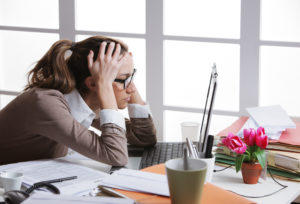Learning how to reduce stress and live in the present moment is no luxury. In this day & age, it’s a necessity.
After all, there’s no question that stress is now a full-blown worldwide epidemic.
A big part of the blame has to fall on technology—email, smartphones, push notifications… The list goes on.
After all, never before have our personal & professional lives been so connected. Never before have we been under so much pressure to be “on” and connected 24/7.
It’s ironic that the very tools we’ve created to help us be more productive have instead made us neurotic and on edge all the time.
So what can you do?
Throw out your phone, cancel your email accounts, and quit your job?
If only.
No, the truth is that email, smartphones, jobs, and all those other sources of stress aren’t going away anytime soon. In fact, the number of tools, apps, and gadgets is growing faster than ever.
Which means that if you’re going to take control over the stress in your life, you’re going to have to find a way to do it without giving up on modern technology.
Here are 3 tips to help you do just that.
How to Reduce Stress Tip #1: Set Healthy Boundaries to Improve Your Work-Life Balance

Raise your hand if you’ve ever felt obligated to respond to work emails from your phone over the weekend.
Shame on you.
I’m sorry. That was harsh. And the truth is, I’ve been just as guilty as you have.
But if we’re going to reduce work-related stress, step #1 is to set some healthy boundaries to achieve a better work-life balance.
Here are the bare minimum boundaries you need to decide on:
Decide when you’re available and when you aren’t.
I recommend being unavailable during all nights and weekends. This means you may have to re-train some colleagues or clients not to contact you when you aren’t at work.
The best way to do that? Stop answering calls and responding to emails. Sooner or later they’ll get the hint.
It helps if you don’t give out your cell phone # at work. Use your work line instead.
I recommend using an app like Inbox Pause to prevent yourself from getting work emails during off hours.
And if you get a lot of work emails over the weekend, consider setting up a simple out-of-office reply along these lines:
“Thanks for your email. I’m currently out of the office and will respond as soon as I can.”
Eventually, your coworkers will get tired of your auto-reply clogging up their inboxes…and they’ll give up on emailing you when you’re at home.
Decide what constitutes an emergency.
Once in a while, an emergency of some kind is bound to come up during a weekend. And it will be very tempting to get sucked into the situation and waste half of your Sunday putting out the latest fire at work.
But is it an emergency? Really?
In some cases…yes, it is. If your business is about to fall apart and only you can save it, then don’t be an idiot. Save the damn company.
But most “emergencies” are really just the result of an impatient boss or client with an urgent task that could easily wait till Monday.
So take a moment to decide what constitutes an emergency and what doesn’t. This will help give you some clarity when responding to these situations.
Decide what you’re willing to sacrifice and make sure it’s worth it.

Working late for the 5th night in a row?
Well, all your hard work might be worth it if you’re up for an enormous promotion that could skyrocket your career and transform your family’s life for the better.
On the other hand, you could just be wasting your time putting in extra work that no one even notices.
There’s nothing wrong with working hard to be successful and achieve great things. I just want you to make sure, ahead of time, that the work you’re putting in will be worth it in the long run.
Nobody on their death bed ever says, “I wish I stayed late at the office more at the expense of spending time with my family.”
Work from home?
If you work from home, as I do, then setting healthy work-life boundaries is a special challenge.
After all, when you work from home there’s no physical distance separating your office from your home, so it’s easy for work to sneak into my personal life.
I recommend setting up a separate home office and using it only for work. This way, you can keep everything work related in that one room.
Get a desktop, instead of a laptop, so you won’t be tempted to bring your work into other rooms of the house.
Finally, set a stopping-point. I quit working every day when my fiancée gets home between 5pm and 5:30pm.
How to Reduce Stress Tip #2: Take Care of Your Body

It may feel like a purely mental/psychological phenomenon, but make no mistake: stress is a full-body response.
It can wreak havoc on everything from your skin tone to your arteries and everything in between.
The good news is that by keeping your body fit, healthy, nourished, and well-rested, you can put yourself in a much better position to deal with stress.
Think about it this way: imagine a crisis comes up at work in the afternoon. Who do you think is going to be able to handle the situation the most effectively and with the least amount of stress:
A) An overweight sedentary person with high blood pressure & diabetes who got 5 hours of sleep last night and is in the middle of an afternoon slump from eating lunch at Chili’s?
B) Or a lean, healthy person who got 9 hours of sleep last night and had a balanced meal at lunchtime before taking a brisk walk?
Obviously the second person will be able to handle the situation better, while experiencing less stress. (All other things being equal.)
When it comes to stress-proofing your body, here are some of the most important things to do:
- Be active every day. Try to take a walk during your lunch break if you can. Moving your body puts you more in touch with your physical self, which helps to get you out of your head and reduce worrying and over-thinking.
- Eat healthy, nourishing foods (especially breakfast & lunch). This helps keep your energy levels consistent.
- Get enough sleep. This is what gives your body the time it needs to rest & recover from a long day so that it’s ready for anything tomorrow.
How to Reduce Stress Tip #3: Practice Mindfulness & Appreciate the Present Moment

Mindfulness is one of the most effective and most underrated tools out there to help reduce stress.
I believe one reason why we get so stressed these days is because we’re always in our heads. We think too much.
And over-thinking leads to worrying, over-analyzing, criticizing, fantasizing, and all sorts of other -izings that aren’t good for us.
We’re physical creatures. But when we get too wrapped up in our own heads, we lose touch with that physical nature.
This is why mindfulness is so helpful for reducing stress.
So how can you become more mindful?
1) The first thing you can do is to develop the habit of stopping to smell the roses.
Stop acting like a mindless ant. Pick your head up and look around.
Appreciate something.
No matter where you are, no matter where you live, I guarantee there is something beautiful around you right now.
Most people will never notice it. But you will.
And you’ll be less stressed—and happier—as a result.
2) The other thing I recommend is starting a 1-minute meditation routine.
Yes, just 1 minute of meditation per day.
The reason I say 1 minute is simple: it’s easy. If you try to meditate for 20 minutes a day, there’s a good chance you won’t last more than a week.
But we can all find 1 minute a day to meditate. That’s less than the length of a song on the radio.
Meditate for just 1 minute per day for at least a month or so. Let it harden into a daily habit. Let it become automatic.
After a month or so, increase the time to 2 minutes per day. Give it another 2-4 weeks.
Then increase to 5 minutes.
Then 10.
Then 15.
Then 20. (Read what Tim Ferriss has to say on the benefits of meditating 20 minutes a day.)
The goal here is to start with a super-small commitment (1 minute) and increase very, very gradually. This is a phenomenal way to make it easy to develop a new habit.
If you aren’t sure exactly how to meditate, keep it simple.
Do NOT go out and buy a whole book on “how to meditate.”
That would be too much time, too much work, too much commitment. You would then have a barrier between you and your goal. (Having to finish the book before you start meditating.)
Instead, just start. Just do it. Dive in now, and learn more about it later.
And luckily, meditation is incredibly simple.
I recommend simply focusing on your breath. Sit with your eyes closed, and put all your mental attention on your body.
Feel your body. Be present right now. And follow each breath as the air moves in and out of your lungs.
This is the #1 best way I know of to bring more peace and contentment to your life.